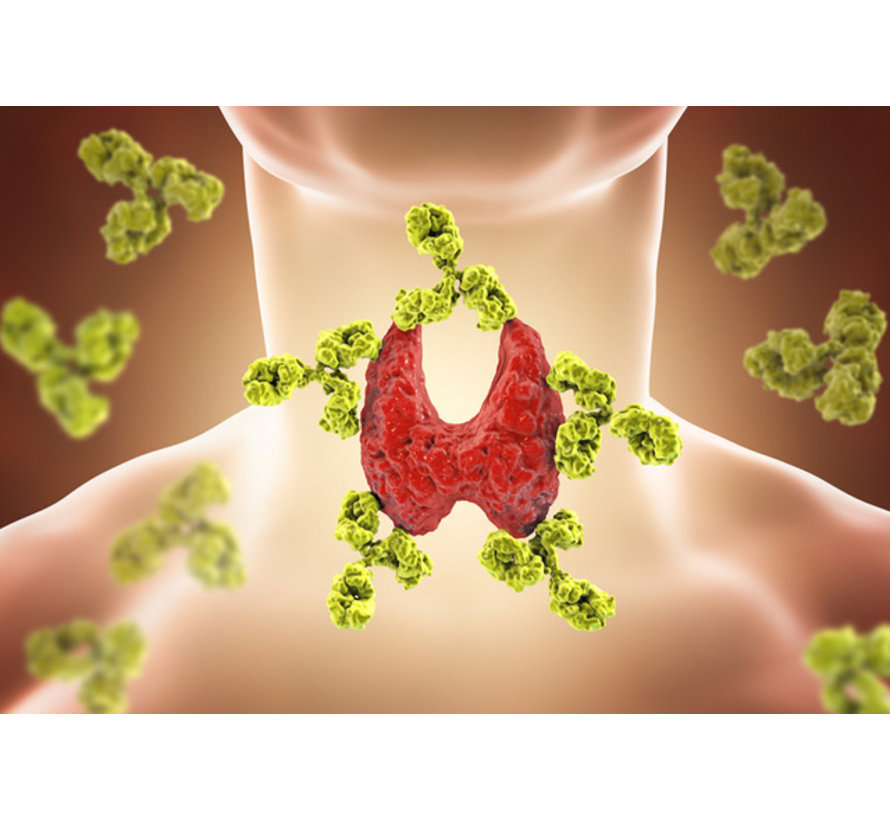Thyreoglobulin antibodies anti-TG thyroid
Thyreoglobulin antibodies also known as Anti-TG As (S), Collid antibodies or Anti-TG antibodies. In English it is called: Anti-thyroglobulin antibody (TAK).
In many disorders of the thyroid gland, the body's immune system does not work properly. This defense system is also called immune system. This immune system deals with intruders in our body, such as viruses and bacteria.
Sometimes the immune system makes a mistake and attacks our own body. The immune system then sees its own cells as enemy invaders. It makes antibodies against its own cells: autoantibodies.
If someone gets sick as a result, we speak of an autoimmune disease. TPO and Tg antibodies attack the thyroid gland's own cells. The antibodies destroy the thyroid cells so that the thyroid gland produces too little or no hormone. This results in hypothyroidism (sluggish thyroid), which is the case with Hashimoto's disease.
The anti-Tg test measures the amount of antibodies to thyreoglobulin (Tg), a protein made in the thyroid gland. Presence of Tg means presence of thyroid tissue. In many thyroid diseases, anti-Tg is made.
If the thyroid gland is removed, for example after thyroid cancer, a Tg determination can be used to see if all the thyroid tissue has been removed. Often the test is performed several times to check whether the tumor has disappeared permanently.
Usually, antibodies against Tg (anti-Tg) are measured at the same time as the Tg determination. If there is anti-Tg in the blood, the Tg test is not reliable and therefore not suitable to measure the effect of thyroid cancer treatment.
Normal:
reference value result should be less than < 115 IU/ml.
In most people, no anti-Tg is present.
Elevated:
In many thyroid diseases, anti-Tg is produced. However, people without thyroid disease may also have elevated antibodies to thyreoglobulin.
If antibodies to thyreoglobulin are elevated, the result of the thyreoglobulin determination may not be reliable because the antibodies interfere with the Tg test.
TPO antibodies also occur in thyroid patients with Graves' disease and other thyroid disorders. These antibodies can be carried on without developing a thyroid disorder.
TSI antibodies (or TSAb) target the TSH receptor: that part of the thyroid cells to which TSH hormone from the pituitary gland attaches. The TSI antibodies act like TSH hormones and stimulate the thyroid to produce hormones. Even when it is not needed. The thyroid produces too much hormone and hyperthyroidism occurs. This happens in Graves' disease.
TBI antibodies block the action of the TSH hormone. The thyroid gland is no longer stimulated to produce hormone and shrivels up. Hypothyroidism develops
Implications for the thyroid
The most common cause of thyroid disease is an autoimmune disorder.
We distinguish the following antibodies:
- antibodies against the thyroid tissue (anti-TPO and anti-Tg)
- antibodies against the TSH receptor
Anti-thyroid antibodies
Anti-TPO and anti-Tg are antibodies against the thyroid gland. They cause inflammation and damage the thyroid gland.
Many patients with Graves' disease and Hashimoto's disease have these antibodies. In patients with other thyroid disorders, these antibodies are also present, but less so.
They are sometimes present in healthy individuals as well, particularly in women over 45 years of age. Not everyone with these antibodies develops thyroid disease.
Antibodies (TPO and Tg) to thyroid %.
- Hashimoto's disease 99.9
- Graves' disease 75
- non-toxic goiter 50
- thyroid carcinoma 10
- Quervain's disease 10
- healthy persons (depending on age and gender) 0 - 30
The cause of autoimmune diseases is not yet known. Heredity, environmental factors, stress, viruses and female hormones play a role. Thyroid patients are more likely to have family members with thyroid disease or diabetes. Thyroid disease is known to be more common in women than in men.
During or after pregnancy and at menopause, there is an increase in thyroid disorders.
Scientists worldwide are conducting research into the origins of autoimmune diseases. In the future, they hope to discover the causes of autoimmune diseases and develop better treatment.
Treatment now consists of symptom relief, by supplementing thyroid hormone with drugs.It is possible that someday scientists will discover how to prevent thyroid disease.
There are no standard reference values available for the Tg test because the results depend heavily on the measurement method used in the laboratory. Therefore, the result is compared to the reference value used by the laboratory performing the test.
Most people do not have anti-Tg. However, in many thyroid diseases, thyreoglobulin antibodies develop. People without thyroid problems may also have elevated antibodies to Tg.
In the presence of anti-Tg, the Tg test is no longer reliable.
Thyreoglobulin is a strong autoantigen. Even in the blood of healthy individuals, B-Lymphocytes with membrane-bound IgM antibodies to thyreoglobulin are detectable.
Highly titratable IgG antibodies to thyreoglobulin (TAK) detectable in the serum are especially together with TPO antibodies (MAK) Anti-TPO a marker for chronic autoimmune thyreoditis type Hashimoto.





